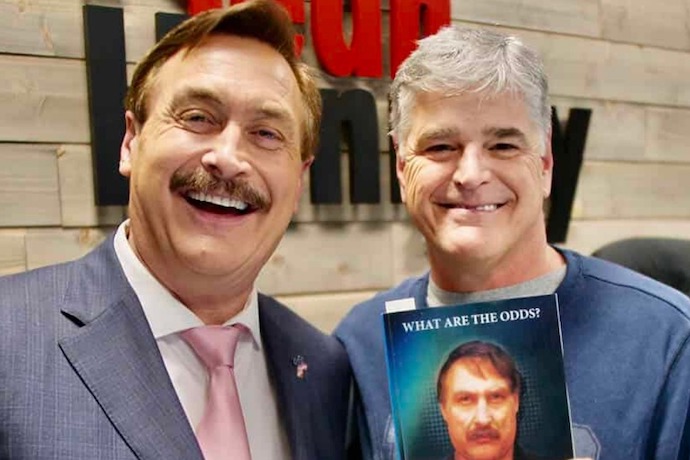What the hell did I just see? Not in a good way.
No. Seriously: what the hell did I just see?
oh — and i cannot stress this enough — my god pic.twitter.com/IJUSUDR6gk
— Bobby Lewis (@revrrlewis) April 27, 2020
The short version of my reaction to My Pillow CEO Mike Lindell pimping his journey “from crack addict to CEO” goes something like this: “What the actual…” followed by a string of nouns and gerunds that Religion Dispatches will not allow me to publish for my own good.
The longer version of my reaction goes like this: let’s cut to the chase and just stipulate that this commercial, like pretty much anything Mike Lindell touches, is utterly bananapants. It’s not so much that he advertises a book telling his life story, nor that he claims that faith was an integral part of his recovery from addiction. It’s nothing that a hundred other writers—this writer included—haven’t told. No, it’s the sheer giddy, delirious enthusiasm with which he makes his sell that really sets this apart. It’s like a warm, friendly bubble bath at the end of the day, except all the bubbles are formed of lysergic acid and recycled Fuller Brush salesmen. This is the stuff that kept Hunter S. Thompson (God rest his soul) paranoid to the very end. It’s one step away from fitting right into the Repo Man script.
Everything from Lindell’s Rupert Pupkin mustache and Rupert Pupkin grin to the cheesy gold text superimposed over bargain-basement CGI clouds and sunshine to evoke some kind of glossy faith implies a rip-off of the tawdriest sort, the kind of remainder-bin book most people sensibly buy for kindling or building walls with. But there’s Lindell nattering away about nearly getting killed over a gambling debt in Mexico as though it were the highlight of his career. Is it a rags-to-riches saga? Is it a story of amazing grace redeeming even the most broken soul? Is it a brag of celebrity friendship with the likes of Jerry Falwell, Jr., despite humble origins? It is apparently all of this and much more. Which sounds awesome, yet there’s something that doesn’t add up about it, something terrible and profound. I think it’s Euclidean geometry.
At the same time, Lindell’s commerical taps deep roots in American religion. We have always been a nation eager to seek redemption from former sins, all the way back to Jonathan Edwards’ sinners in the hands of an angry God to the Methodist and Presbyterian strivers of the Second Great Awakening, all the way up to today’s megachurches preaching self-help.
More important, we’ve always been a nation willing to try to package faith for easy resale. Happy-faced entrepreneurial preachers have been a part of the American landscape since the first circuit riders hit the frontier villages. Even today, there’s no difference between Mike Lindell and a dozen televangelists, save a thousand milligrams of lithium. If you have any doubts about the commodification of the healing grace of God, google it for yourself. There’s a part of American Christianity that believes deeply and sincerely that if they can make it out of the lion’s den, they can teach you to do the same—for a modest fee, of course.
That kind of hucksterism is probably exactly why a guy like Lindell winds up in Donald Trump’s orbit. There he was, near the start of our long national nightmare (no, the other, more recent one), ostensibly to be thanked by Trump for manufacturing N95 surgical masks, but in fact to praise Trump himself and drop nuttery:
“God gave us grace on November 8, 2016, to change the course we were on,” the pro-Trump businessman said. “God had been taken out of our schools and lives, a nation had turned its back on God. I encourage you to use this time at home to get back in the word. Read our Bible and spend time with our families.”
Trump-as-the-chosen-hand-of-God is relatively new theology, to be sure, though no doubt the theology leading Trump to tout Lindell as a Senate candidate in Minnesota. (Lindell wouldn’t be the first Quistian candidate from the Land of 10,000 Lakes.)
But Lindell’s remarks point to another extensive thread in American religious history: the belief, contrary to every bit of scriptural evidence, that the Christian God only dispenses grace and mercy to those who walk the straight and narrow line. The specific bit about God being removed from America’s schools dates back to Engel v. Vitale, the 1962 Supreme Court decision barring mandated prayer in public schools. It might as well be as old as Moses, given what a commonplace it is for right-wing Christians.
The rest of it is a chestnut of its own. We ought to just be grateful that Lindell isn’t enforcing coronavirus rectitude with a hatchet. (Carrie Nation was also an unabashed self-promoter, by the way.) It’s a strand that goes back to Wesleyan perfectionism and Calvinist propriety, some of the deepest roots of American religion. It may look like faith seen through a funhouse mirror, but in the end, it raises the same question those mirrors raise. Namely: what the hell did I just see? Could it be me?


